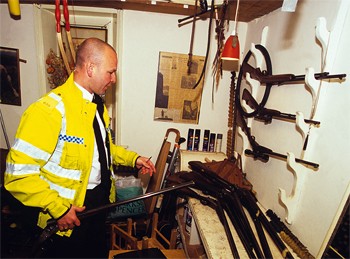Who is policing the police?

The police service in the UK does a very difficult job. I should know, because I was a police officer for 30 years. Barring my final 18 months in the force, I was a firearms enquiry officer for the last 10 years of my service, doing shotgun and firearms certificate renewals. When I started the role in 1992, I knew nothing about firearms and shooting.
I learned very quickly by asking questions of certificate holders who love to talk about their sport. Like most people, they sometimes brag but by and large they are the rock of society. They are law-abiding decent people with a sometimes expensive hobby. I would like to think that over the years I gave a good service to the public. If I didnt know the answer to a question, I would find out and then ring them back. Little things like this build confidence in the police service as a whole. Since I retired in 2004, I have met a side of the police I never knew existed.
While the vast majority of the firearms officers and support staff do a fantastic job, there is an element who bring the whole system into disrepute. They make up their own rules and regulations, and are generally unhelpful. They forget that they are providing a service to a law-abiding member of society. In fact, I would go further, the certificate holder has to be more law abiding than the average member of the public, because if theres any transgression his hobby/sport or occupation certificates are brought under scrutiny.
The police, generally, are used to dealing with the criminal aspect of society. It follows that when dealing with the lawabiding citizen they should treat them accordingly, but time and time again these people are treated shabbily. What senior officers appear to forget is that the respect for the police is getting lower each year. For each certificate holder to whom they are disrespectful, they are putting another nail in the coffin of policing by consent. I have seen incidents where people have been made criminals simply because they have failed to comply with an administrative system.
In other cases, police officers have openly lied, yet their senior officers have backed them. The appeal system is prohibitively expensive and loaded in favour of the police. It seems to me that the police use the prohibitive appeal system to their advantage. If any minor transgression is made, they can and sometimes do revoke shotgun certificates. When the certificate holder complains the response is simply, If you dont like it, appeal. But you have to instruct and pay for your own solicitor and barrister. If you win you cannot claim costs against the police. Then if you lose you will have to pay all the police costs. It all seems very unfair. So who polices the police?
The Independent Police Complaints Commission (IPCC), with theoretically far more power than the complaints authority it replaced, has failed to live up to the promise of genuine reform. Its problem has been the Governments reluctance to upset the police by giving the IPCC the political support to carry out its role, coupled with a lack of backbone within the Commission to demand it.








